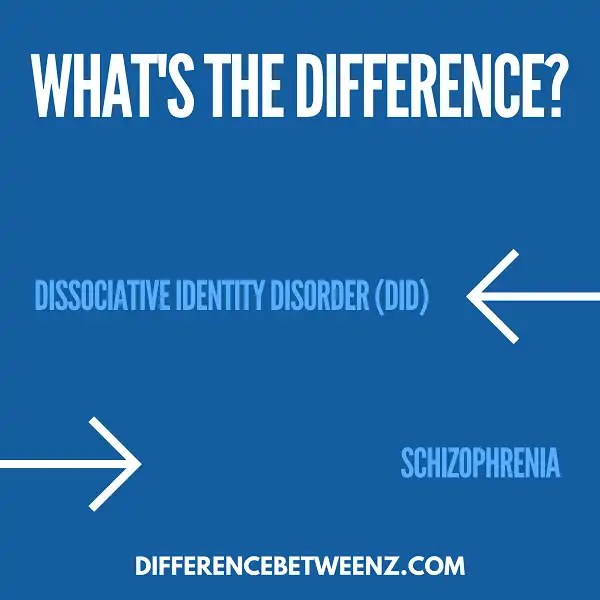Have you ever wondered what the difference between Dissociative Identity Disorder (DID) and Schizophrenia is? Many people use these terms interchangeably, but in reality, they are two unique mental health conditions with different causes and symptoms. In this blog post, we will be diving deep into the differences between DID and Schizophrenia to help improve your understanding of both conditions.
We’ll look at how each condition manifests itself physically and mentally, as well as provide an overview of appropriate treatment options. By the end of this article, you should have a better comprehension of how these two disorders differ from one another so that you can make informed decisions about your mental health journey. So let’s get started!
What is Dissociative Identity Disorder (DID)?
- Dissociative Identity Disorder (DID) is a mental health condition affecting around 2% of the world’s population. It is characterized by a disruption in a person’s sense of identity leading to the emergence of two or more distinct personalities or mentally distinct states that intermittently take control of their behavior.
- Each personality state may have its own gender, age, behaviors, beliefs, and memories. Living with DID can be immensely challenging for individuals as it can greatly disrupt their daily life, causing issues such as problems with employment and educational pursuits, having stable relationships, and coping with stress.
- Furthermore, individuals suffering from DID may also experience additional symptoms such as flashbacks, insomnia loss of energy, and feelings of depersonalization which can further add to their overall distress. For these reasons, it is important that they receive timely and effective treatment in order to help manage symptoms and improve quality of life.
What is Schizophrenia?
Schizophrenia is a serious mental health disorder that can drastically affect an individual’s cognitive and emotional functioning. Schizophrenia is characterized by difficulty distinguishing between reality and one’s own thoughts and feelings, known as “psychotic symptoms.”
Symptoms of Schizophrenia can include delusions, disorganized thinking, paranoia, hallucinations, and reduced ability to function in daily activities. People who suffer from Schizophrenia may be prescribed antipsychotic medication to help manage their symptoms. However, Schizophrenia requires long-term medical care, and treatment with other therapists may be needed for the individual to cope with the condition throughout their life.
Difference between Dissociative Identity Disorder (DID) and Schizophrenia
Dissociative Identity Disorder (DID) and Schizophrenia are two serious mental health conditions that cause otherwise healthy people to suffer from significant disruptions in cognition, perception, emotionality, and behavior.
- The primary difference between the two conditions lies in the experiences and symptoms of each individual; DID is characterized by shifts in identity or sense of self, whereas schizophrenia is typified by psychosis such as hallucinations and delusions.
- Symptoms of Dissociative Identity Disorder include loss of or altered memories, mood swings, depression, anxiety, disorganized speech, multiple distinct personalities formed out of fragments of one’s trauma history along with physical forms of dissociation.
- As opposed to Dissociative Identity Disorder symptoms which are slightly more subtle in nature with a psychological impact on individuals; schizophrenia is concretely expressed through experienced breaks with reality evidenced by delusions or hallucinations and flat or inappropriate affect.
Altogether Dissociative Identity Disorder (DID) and schizophrenia can have a negative impact on an individual’s life if left untreated, however, because the two disorders have different underlying causes for their presence, being able to distinguish between them can lead to a better treatment outcome for those affected.
Conclusion
While DID and Schizophrenia share some similar symptoms, they are two very different disorders. It is important to be correctly diagnosed so that you can get the proper treatment for your specific condition. If you or someone you know is displaying any of the signs or symptoms of either disorder, please reach out to a mental health professional for help.


